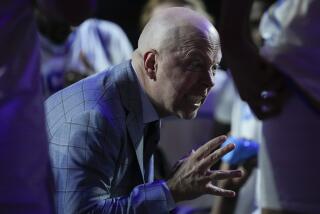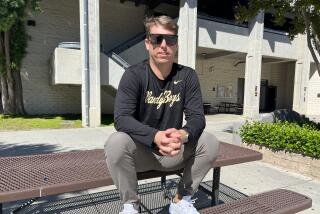Terry Crisp Has Flames Crackling
- Share via
MONTREAL — Terry Crisp has been a bit player and a background dancer. Now he’s finally a leading man.
He’s got a flair for comedy and he’s even been in a kissing scene in front of almost 18,000 people.
“I’m learning,” says Crisp, who has coached the Calgary Flames into the Stanley Cup finals after 11 years as a mediocre NHL player.
“My old coach (with the Philadelphia Flyers), Fred Shero, said in order to be a good coach, you gotta be a great actor. I didn’t realize what he meant until I became a coach. I know exactly what he means now.
“A lot of nights you do things you have no heavenly idea you want to do. None. Like lots of times you go into that dressing room and (scream) like you never did before. You have no more desire to do it than fly to the moon, but you know that’s required at that given time.
“Other nights, you’re right up to here (he puts his hand to his neck) and you want to just tear somebody’s head off. You’re ready to burst, like a volcano ready to erupt. And you walk in there very quietly and coolly and calmly and say, ‘You’re playing well, guys, keep it going. Don’t worry, stay positive.’ ”
In 1987-88, his rookie season as coach, Crisp wasn’t always such a good actor. He wore his emotions on his sleeve and didn’t care whose feelings he hurt.
“I guess I’ve mellowed,” he says. “But I still get emotional sometimes.”
Like on the night of May 8, after Al MacInnis’ overtime goal gave Calgary a 2-1 victory over the Chicago Blackhawks in Game 4 of the Stanley Cup semifinals.
First, Crisp climbed on top of the plexiglass behind the Flames’ bench at Chicago Stadium and triumphantly raised both arms.
Then he spotted Norma MacNeil, the wife of Calgary assistant general manager Al MacNeil, in the crowd, leaned over and planted a big smooch right on her kisser.
Spontaneous? Impulsive?
“Hey, I got to kiss a good-looking woman,” Crisp says. “Now was that calculating or not?”
According to calculations, Crisp is already one of hockey’s most successful coaches.
He has reached the 100-victory plateau faster than anyone in NHL history. Each of his first two seasons have ended with Calgary in possession of the league’s top record. And he has the franchise on the brink of its first Stanley Cup championship, with only the Montreal Canadiens in the way.
Pretty lofty stuff for a round-faced redhead who wasn’t even the best hockey player to come out of Parry Sound, Ontario.
“I was probably in the class of Bobby Orr,” he says, referring to his hometown’s favorite son. “I just didn’t get the recognition I deserved.”
Crisp scored 67 goals in 536 games with the Flyers, Boston Bruins, New York Islanders and St. Louis Blues.
His career was highlighted by Philadelphia’s championship runs in 1974 and 1975.
Those were the Flyers of Bobby Clarke, Bill Barber, Rick MacLeish and the Broad Street Bullies: Dave “The Hammer” Schultz, Don “Big Bird” Saleski and Bob “The Hound” Kelly.
Back then, Crisp centered some of the NHL’s lowest-scoring lines. But that didn’t mean the units didn’t have punch.
“Sometimes I had the Bird on one side and Schultzie on the other,” he says. “That’s when I knew the puck wasn’t going to get dropped. We’re heading toward the faceoff circle but I knew the chances of getting a faceoff were slim and none.”
Despite his presence on those lines and the fact that fights were always happening around him, Crisp wasn’t much of a brawler. In his 11 seasons, he was assessed only 135 penalty minutes--roughly a third of what Schultz got in a typical season.
“I was the most popular guy on the ice,” Crisp says. “Everybody wanted to dance with me.
“I used to tell them: ‘Look, what are you going to prove by beating me up? If you beat up Schultzie, you prove something. Tomorrow in the papers, it’ll say you beat somebody. If you beat me up, what’s it going to say--you whaled on Crispie? Big deal. That’s not going to get you any marks.’ ”
At one time, Crisp thought he wanted to hand out marks.
“As your career winds down, you start looking at what’s left to do,” he says. “If I wasn’t going to be a hockey player, I wanted to be a high school teacher.”
Really? Did he have a love of schoolwork? Was he a bookworm?
“No, I was a (terrible) student. I went because my mom made me go.”
So why did he want to be a teacher?
“To get even.”
More to Read
Go beyond the scoreboard
Get the latest on L.A.'s teams in the daily Sports Report newsletter.
You may occasionally receive promotional content from the Los Angeles Times.






